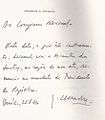Jânio Quadros
| His Excellency Jânio Quadros | |
|---|---|
 | |
| 22nd President of Brazil | |
|
In office January 31, 1961 – August 25, 1961 | |
| Vice President | João Goulart |
| Preceded by | Juscelino Kubitschek |
| Succeeded by | Ranieri Mazzilli |
| 18th Governor of São Paulo | |
|
In office January 31, 1955 – January 31, 1959 | |
| Vice Governor | Erlindo Salzano |
| Preceded by | Lucas Nogueira Garcez |
| Succeeded by | Carvalho Pinto |
| 24th and 36th Mayor of São Paulo | |
|
In office April 8, 1953 – July 7, 1954 | |
| Preceded by | Armando de Arruda Pereira |
| Succeeded by | Porfírio da Paz |
|
In office January 17, 1955 – January 31, 1955 | |
| Preceded by | Porfírio da Paz |
| Succeeded by | William Salem |
|
In office January 1, 1986 – January 1, 1989 | |
| Preceded by | Mário Covas |
| Succeeded by | Luiza Erundina |
| Member of the Chamber of Deputies | |
|
In office February 1, 1955 – January 31, 1961 | |
| Constituency | Paraná |
| Member of a State Assembly | |
|
In office February 1, 1951 – April 8, 1953 | |
| Constituency | São Paulo |
| Member of a City Council | |
|
In office February 1, 1947 – February 1, 1951 | |
| Constituency | São Paulo |
| Personal details | |
| Born |
Jânio da Silva Quadros January 25, 1917 Campo Grande, Mato Grosso, Brazil |
| Died |
February 16, 1992 (aged 75) São Paulo, São Paulo, Brazil |
| Nationality | Brazilian |
| Political party |
PDC (1947–1960) PTN (1960–1961) PMDB (1980–1980) PTB (1980–1986) Independent (1986–1989) PSD (1989–1989) Independent (1989–1992) |
Jânio da Silva Quadros (Portuguese pronunciation: [ˈʒɐ̃ɲu dɐ ˈsiwvɐ ˈkwadɾus]; January 25, 1917 – February 16, 1992[1]) was a Brazilian politician who served as President of Brazil from 31 January to 25 August 1961, when he resigned from office.
Career
Quadros was born in Campo Grande, Mato Grosso do Sul. His meteoric career can be attributed to his widespread use of populist rhetoric and his extravagant behavior. He became mayor of the city of São Paulo in 1953 and governor of the state of São Paulo just two years later, in 1955. He was elected president of Brazil by a landslide in 1960, running as the candidate of National Labour Party (PTN). When he took office on January 31, 1961; it was the first time since Brazil became a republic in 1889 that an incumbent government peacefully transferred power to an elected member of the opposition. It was also the first time in 31 years that the presidency was not held by an heir to the legacy of Getúlio Vargas.
Quadros laid the blame for the country's high rate of inflation on his predecessor, Juscelino Kubitschek. As president, Quadros outlawed gambling, banned women from wearing bikinis on the beach, and established relations with the Soviet Union and Cuba, trying to achieve a neutralist international policy. The re-establishment of relations with the Socialist Bloc in the middle of the Cold War cost him the support of the UDN in Congress, so that he was left with no real power.
Resignation
On August 21, 1961, Quadros signed a bill annulling the mining rights of Hanna Mining, thus returning the iron ore reserves of the Minas Gerais region to the national reserve. Quadros resigned on August 25, 1961, citing foreign and "terrible forces" in his cryptic resignation letter. His resignation is commonly thought to have been a move to increase his power, expecting to return to the presidency by the acclamation of the Brazilian people or by the request of the National Congress of Brazil and the military. This maneuver, however, was immediately rejected by the Brazilian legislature, which accepted his resignation and called on the president of the Chamber of Deputies of Brazil, Pascoal Ranieri Mazzilli, to assume office until the vice president, João Goulart, came back from his trip to Communist China. Goulart finally took the oath as president on September 7, 1961, although his power was restricted by an amendment to the Constitution passed on September 2, that created a parliamentary system of Government. He was not of the same party as Quadros; at the time, Brazilians could vote for a ticket that had candidates for president and vice president from different parties.
Quadros's resignation initiated a serious political crisis that culminated in a military coup in 1964. While the military did not allow him to participate in politics, by the 1980s Quadros had made a comeback. He joined the Partido Trabalhista Brasileiro, and was candidate for governor of São Paulo in 1982, only to be defeated by André Franco Montoro. Nevertheless, he was elected mayor of São Paulo in 1985, for the second time in his career, defeating the favored candidate, Fernando Henrique Cardoso, later president of Brazil. Quadros served as mayor until 1988 and died in São Paulo in 1992.
Gallery
-

Jânio Quadros in 1961
-

Jânio Quadros
-

Quadros' resignation letter
See also
References
- ↑ "Jânio da Silva Quadros" (in Portuguese). Archived from the original on 29 July 2008. Retrieved 4 July 2015.
External links
| Wikimedia Commons has media related to Jânio Quadros. |
| Political offices | ||
|---|---|---|
| Preceded by Armando de Arruda Pereira |
Mayor of São Paulo 1953–1955 |
Succeeded by William Salem |
| Preceded by Lucas Nogueira Garcez |
Governor of São Paulo 1955–1959 |
Succeeded by Carlos Alberto Alves de Carvalho Pinto |
| Preceded by Juscelino Kubitschek |
President of Brazil 1961 |
Succeeded by Ranieri Mazzilli |
| Preceded by Mário Covas |
Mayor of São Paulo 1985–1988 |
Succeeded by Luiza Erundina |
| ||||||||||||||||||||||
| ||||||||
| ||||||||
|